News & Events
Youth Month: Minister challenges students to give critical feedback
The Minister of Justice and Correctional Services, Ronald Lamola, in collaboration with the Unisa Western Cape Regional Students Representative Council (RSRC), hosted a student dialogue at the Unisa Cape Town Campus in Parow on 28 May to celebrate the 25th anniversary of the Constitution.
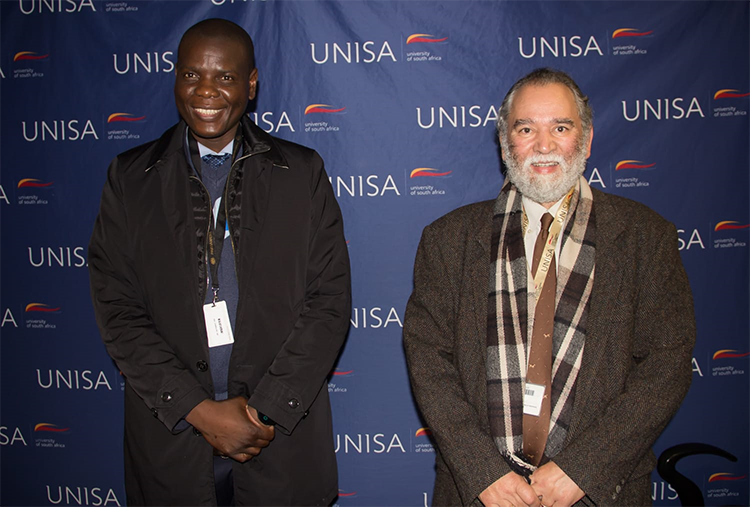
Minister of Justice and Correctional Services, Ronald Lamola, and Regional Director: Unisa Western Cape, Dr Keith Jacobs
The theme of the dialogue was “The Constitution as a catalyst for providing equal access to quality further education”, and the engagement with students forms part of the department’s efforts to reflect on and promote conversation about the milestone 25th anniversary of South Africa’s Constitution. Other panel members included Neeshan Balton, Chief Executive Officer of the Ahmed Kathrada Foundation, Advocate André Gaum, South African Human Rights Commission Commissioner, and former Constitutional Court Judge Albie Sachs.
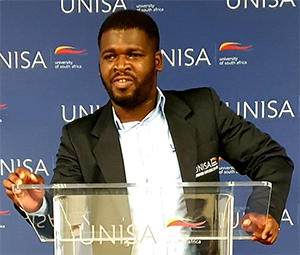
Chairperson of the Unisa Western Cape RSRC, Sifundo Ndzube
Unisa Western Cape RSRC proud of creating a platform for Minister Lamola
The Chairperson of the Unisa Western Cape RSRC, Sifundo Ndzube, expressed his satisfaction at the hard work of the RSRC that went into organising the event and creating the platform at Unisa for Minister Lamola. He thanked the Department of Justice for the professional way in which they worked together with the Unisa structures in putting the event together.
HE a resource for African development
Professor Puleng LenkaBula, Unisa Principal and Vice-Chancellor (VC), joined the proceedings via video conference to welcome students who braved the weather to attend the event. In her opening remarks, the VC acknowledged that the questions of funding of higher education for countries like South Africa are quite complex, but that they are questions that must be grappled with in relation to the developmental challenges in our country. She said that “they are entwined with the aspirations of the African continent asserted through the Agenda 2063, ensuring that higher education becomes a resource for the developmental trajectories of African countries”.
Noting that of the seven million youth in our country looking for education or economic opportunities, only one million are admitted to universities, the VC stressed the importance of taking advantage of 4IR opportunities to bridge the digital divide to “activate youthful dividends for transforming ourselves and our university for the better”.
She said it is imperative that we draw comparative lessons from countries with similar economies to ours, that have also grappled with the question of financing of higher education, so that we are able to facilitate access with success to higher education and also compel the private sector and civil society to rally with the state in ensuring that youth, young adults and more older persons have the opportunity to rethink higher education and education as a transforming possibility.
Constitution a powerful tool
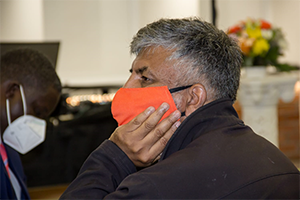
Neeshan Balton, CEO of the Ahmed Kathrada Foundation
The VC was followed by Neeshan Balton, CEO of the Ahmed Kathrada Foundation. He stated that he believed students must act as catalysts and use the Constitution as a tool to campaign and organise themselves around issues like quality education. Balton stated that many of the organisations developed post-1994 to deal with issues inherited from our colonial past were “ineffective and weak” even though they were set up through a “democratic government, with a people-centred Constitution, legislation and policies”.
Balton urged students to read Black Lives Matter activist Alicia Garza’s book The purpose of power: How we come together when we fall apart. He also shared the following excerpt: “Organisations are a critical component of movements. They become the places where people find community, learn what is happening around them, why it is happening, and who it benefits and who it harms. Organisations are places where we learn skills to take action to change the laws and change culture. Organisations are where we come together to determine what we can do to face the problems facing our communities”. He highlighted the work of Section 27 and commended them on how they use the provisions of the Constitution to effect real change in society.
A need to reflect
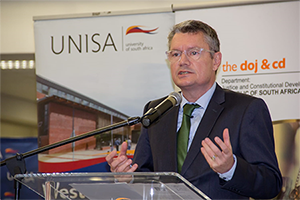
South African Human Rights Commission Commissioner, Advocate André Gaum
South African Human Rights Commission Commissioner, Advocate André Gaum, began his address by reminding the audience that “our Constitution is considered to be one of the more progressive in the world”. He said that the anniversary of the 25th year of our Constitution marked an opportunity for us to reflect on whether government, has embraced the founding provisions and constitutional values of human dignity, non-racialism, upholding the rule of law, accountability and transparency. “We have to reflect on whether we have delivered on the right to further education if we are tolerant of freedom of expression and whether we embrace the right to peaceful protest,” said Gaum.
He emphasised that this reflection was important to “create an awareness of the milestone relating to the 25th year of the Constitution and to reinforce the values and principles thereof, especially in relation to achieving substantive equality and as a catalyst for providing equal access to quality further education”. He reiterated that the Human Rights Commission is dedicated to continuing to raise awareness of the rights provided in the Constitution, which is “indicative in the many matters the commission continues to take on including matters concerning unfair discrimination, hate speech and the provision of education, including basic education”. Gaum said he believes this is critical to ensure that South African becomes a better country and that its citizens are empowered.
A vibrant question and answer session followed, and students were given an opportunity to engage the panel on topics ranging from language policy in higher education, to equality in education and the Constitution in relation to higher education.
Recalling when the doors were opened
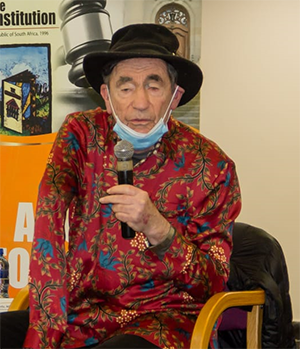
Former Constitutional Court Judge Albie Sachs
Judge Albie Sachs received a standing ovation for his response to a question about whether the Constitution increases or decreases equality in institutions of higher learning. In his response, he recalled 26 June 1965 in Kliptown, the venue for the adoption of the Freedom Charter. Themes were collected and incorporated into the ten chapters of the Freedom Charter, one of them being “The doors of learning shall be opened”. “It was wonderful,” said Sachs, “to hear that idea being expressed in that way. Who were we? What right did we have to even make those claims?”
“People claim that nothing has changed” said Sachs, but in recalling his own “privileged life” and his experiences during apartheid as an activist he pondered how much has changed. “We couldn’t meet like this, we couldn’t criticise in the way we criticise our government today,” he said. “We are not an equal society by any means, but there is one huge difference compared to the past and that is the Bill of Rights”. Judge Sachs urged that while the Constitution could not “build houses or create jobs, it should be used as the mechanism to achieve those things”.
Debate encouraged
Minister of Justice and Correctional Services, Ronald Lamola, ended proceedings by expressing his wish that the student dialogues would generate and encourage debate across the country. He reiterated that the Constitution plays a role as a “social contract, binding all of us, state and citizens”.
Lamola mentioned how South Africa is one of “very few countries that has put the realisation of socio-economic rights into its Constitution, as one of the objectives the government has to work towards achieving”. He noted that the past 25 years have shown several achievements, but that they have also been marred by failures and challenges, one of these being corruption, which he said is “a result in the failure of consciousness amongst those entrusted to implement the laws and policies of this country”. These challenges and failures, said Lamola, resulted in the Commission of Enquiry into State Capture, which he hopes will help us to confront the failures and challenges of the past 25 years and “deal with society in a manner that we’re able to realise the dream of a better life for all, as was proclaimed by Nelson Mandela in 1994”.
Lamola concluded by delivering a challenge to all students present to continue to give government critical feedback that “will enable us as a country to move forward and ensure the country lives to its expectations in terms of the Constitution’s objectives”.
Sifundo Ndzube, during his closing remarks as Chairperson of the Unisa Western Cape RSRC and co-organiser of the event, emphasised the fact that, “on paper, the rights of students are enshrined in the constitution, but that seems to be where it remains – on paper”. He cited the equality of languages as tools of instruction, comparing the historic advantages of English and Afrikaans over indigenous languages. “We invite the Minister to consider proposing amendments to legislation since, in the current dispensation, students who are protesting (exercising their right to free speech), are often deemed in contravention of the law, and may end up in jail,” he concluded.
*By Vicky-Lee Shew, Communications Officer, Unisa Western Cape Region
Publish date: 2021-06-07 00:00:00.0

